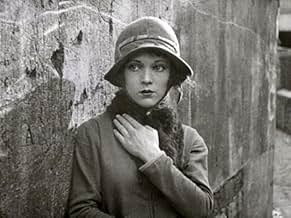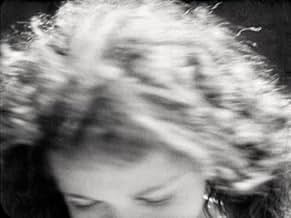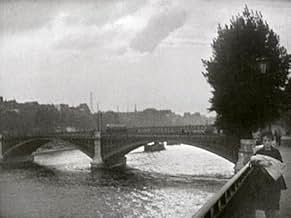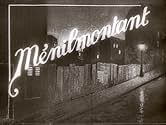Ménilmontant
- 1926
- 38 मि
IMDb रेटिंग
7.8/10
2.8 हज़ार
आपकी रेटिंग
अपनी भाषा में प्लॉट जोड़ेंA couple is brutally murdered in the working-class district of Paris. Later on, the narrative follows the lives of their two daughters, both in love with a Parisian thug and leading them to ... सभी पढ़ेंA couple is brutally murdered in the working-class district of Paris. Later on, the narrative follows the lives of their two daughters, both in love with a Parisian thug and leading them to separate ways.A couple is brutally murdered in the working-class district of Paris. Later on, the narrative follows the lives of their two daughters, both in love with a Parisian thug and leading them to separate ways.
कहानी
क्या आपको पता है
- ट्रिवियाPauline Kael said this was her favorite film of all time.
- इसके अलावा अन्य वर्जनThis film was published in Italy in an DVD anthology entitled "Avanguardia: Cinema sperimentale degli anni '20 e '30", distributed by DNA Srl. The film has been re-edited with the contribution of the film history scholar Riccardo Cusin . This version is also available in streaming on some platforms.
- कनेक्शनFeatured in The language of the silent cinema 1895-1929 - Part II: 1926-1929 (1973)
फीचर्ड रिव्यू
This is one that no one can afford to miss in a lifetime of viewing, that is no one who's interested in the deepest workings of how things move. In my third viewing now, it may just be the pinnacle of the first 30 years. But before saying more, let's quickly clear the air from fixed perceptions so it can rise up in front of us vibrantly as what it is, all the more greater.
First to reclaim it from the museum of merely academic appreciation that covers, silents in particular, with the shroud of musky relic. Coming to us from so far back it may appear as the studied work of a venerable master - and yet it's the work of a 25 year old (filming started in '24) who shot it by himself with his girl around Paris, hand-held, and edited in camera.
The workings of fate or grande history that demand crowds and decor are pushed to the side, this is a youthful cinema ("indie" we would call it now) that beats with the heart of young people trying to fathom life in the complex city and I urge you see it as such. Kirsanov was an émigré new to Paris after all. Watch it as puzzling modern life that keeps you awake at nights, not as some scholar's symbolism.
Then to reclaim it from the clutches of "experimental" and "avant- garde", labels as though it were just about the tweaking of form, an exercise of trying to be ahead of time. There are many of those from the era, marvelous experiments in seeing, and Kirsanov was not just a wide-eyed country boy - he had articles published on "photogenie" before he made this and would know the radical tropes. But this enters beyond.
The best way I find myself able to describe it is this.
There's a story here that you can unfold in a way that it makes simple sense, melodrama about an orphaned girl lost in the big city. Melodrama since well before of course, offered us a certain facsimile of life where this clearly begat that, the disparity caused grief, the resolutions restored clarity. There's a heart breaking scene here on a bench worthy of Chaplin. She wanders with a baby cradled in her arms, trials and tribulations that innocence must go through.
Now this facsimile rippled and violently tossed about like curtains at an open window are shuffled by gusts of air, ellipsis, abstraction, rapid-fire montage, and all the other tools that Kirsanov would have known from being in Paris at the time of Epstein and others. So far so good. The film would have been great with just this mode, wholly visual, "experimental". The girl Nadia is lovely, the air dreamlike.
But there's something else he does, that is still in the process of being fathomed decades later by penetrative thinkers like Lynch. There are hidden machinations in the world of the film, illogical machinery at play, that turn at a level deeper than we can clearly fathom at any point. You should know here that Kirsanov had to cross a Europe collapsing by war and revolutions to reach Paris, he would have found out months after he left home that his father had been murdered on the street by communist thugs.
Suddenly there is the nagging sense of a presence that moves behind appearances, giving rise to mysteriously connected perturbations. A marvelous sequence shows one sister being seduced in a room (uncertain, but giving in), the other sister alone in their bed reading from a book as if daydreaming the whole dalliance.
And then the second sister knowingly letting herself be seduced, the first observing the scene from below as if she has splintered off into separate selves, one being seduced above, the other realizing in hallucinative daydream the mistake of giving herself to this boy.
This is marvelous. Impulses from an open window, and through the flimsy fabric of the curtains, the vague coming and going of people in a room, half-finished glimpses, but we begin to sense pattern here. Two girls, two murders, two seductions, but one calculated and wrong.
The most startling moment is the opening; a puzzling violence has stolen into this world, creating the story, rendered with haunting imagery of a struggle before a window. Now every account of the film I've read believes these are the parents of the girls and some madman, but this is not said anywhere. In the graveyard after, we see the father's grave with wreaths, a funeral that day, but none on the mother's, it looks abandoned. Maybe someone was caught where he shouldn't have been, calculated and wrong.
And this veiled and bubbling causality goes through everything to appear again in the finale; the first murder wasn't random, what says the second is? Maybe a holdup just so happened to visit him, maybe someone was paid off. The door is open, you go in where your body takes you.
Something to meditate upon
First to reclaim it from the museum of merely academic appreciation that covers, silents in particular, with the shroud of musky relic. Coming to us from so far back it may appear as the studied work of a venerable master - and yet it's the work of a 25 year old (filming started in '24) who shot it by himself with his girl around Paris, hand-held, and edited in camera.
The workings of fate or grande history that demand crowds and decor are pushed to the side, this is a youthful cinema ("indie" we would call it now) that beats with the heart of young people trying to fathom life in the complex city and I urge you see it as such. Kirsanov was an émigré new to Paris after all. Watch it as puzzling modern life that keeps you awake at nights, not as some scholar's symbolism.
Then to reclaim it from the clutches of "experimental" and "avant- garde", labels as though it were just about the tweaking of form, an exercise of trying to be ahead of time. There are many of those from the era, marvelous experiments in seeing, and Kirsanov was not just a wide-eyed country boy - he had articles published on "photogenie" before he made this and would know the radical tropes. But this enters beyond.
The best way I find myself able to describe it is this.
There's a story here that you can unfold in a way that it makes simple sense, melodrama about an orphaned girl lost in the big city. Melodrama since well before of course, offered us a certain facsimile of life where this clearly begat that, the disparity caused grief, the resolutions restored clarity. There's a heart breaking scene here on a bench worthy of Chaplin. She wanders with a baby cradled in her arms, trials and tribulations that innocence must go through.
Now this facsimile rippled and violently tossed about like curtains at an open window are shuffled by gusts of air, ellipsis, abstraction, rapid-fire montage, and all the other tools that Kirsanov would have known from being in Paris at the time of Epstein and others. So far so good. The film would have been great with just this mode, wholly visual, "experimental". The girl Nadia is lovely, the air dreamlike.
But there's something else he does, that is still in the process of being fathomed decades later by penetrative thinkers like Lynch. There are hidden machinations in the world of the film, illogical machinery at play, that turn at a level deeper than we can clearly fathom at any point. You should know here that Kirsanov had to cross a Europe collapsing by war and revolutions to reach Paris, he would have found out months after he left home that his father had been murdered on the street by communist thugs.
Suddenly there is the nagging sense of a presence that moves behind appearances, giving rise to mysteriously connected perturbations. A marvelous sequence shows one sister being seduced in a room (uncertain, but giving in), the other sister alone in their bed reading from a book as if daydreaming the whole dalliance.
And then the second sister knowingly letting herself be seduced, the first observing the scene from below as if she has splintered off into separate selves, one being seduced above, the other realizing in hallucinative daydream the mistake of giving herself to this boy.
This is marvelous. Impulses from an open window, and through the flimsy fabric of the curtains, the vague coming and going of people in a room, half-finished glimpses, but we begin to sense pattern here. Two girls, two murders, two seductions, but one calculated and wrong.
The most startling moment is the opening; a puzzling violence has stolen into this world, creating the story, rendered with haunting imagery of a struggle before a window. Now every account of the film I've read believes these are the parents of the girls and some madman, but this is not said anywhere. In the graveyard after, we see the father's grave with wreaths, a funeral that day, but none on the mother's, it looks abandoned. Maybe someone was caught where he shouldn't have been, calculated and wrong.
And this veiled and bubbling causality goes through everything to appear again in the finale; the first murder wasn't random, what says the second is? Maybe a holdup just so happened to visit him, maybe someone was paid off. The door is open, you go in where your body takes you.
Something to meditate upon
- chaos-rampant
- 30 सित॰ 2015
- परमालिंक
टॉप पसंद
रेटिंग देने के लिए साइन-इन करें और वैयक्तिकृत सुझावों के लिए वॉचलिस्ट करें
विवरण
- चलने की अवधि38 मिनट
- रंग
- ध्वनि मिश्रण
- पक्ष अनुपात
- 1.33 : 1
इस पेज में योगदान दें
किसी बदलाव का सुझाव दें या अनुपलब्ध कॉन्टेंट जोड़ें


















